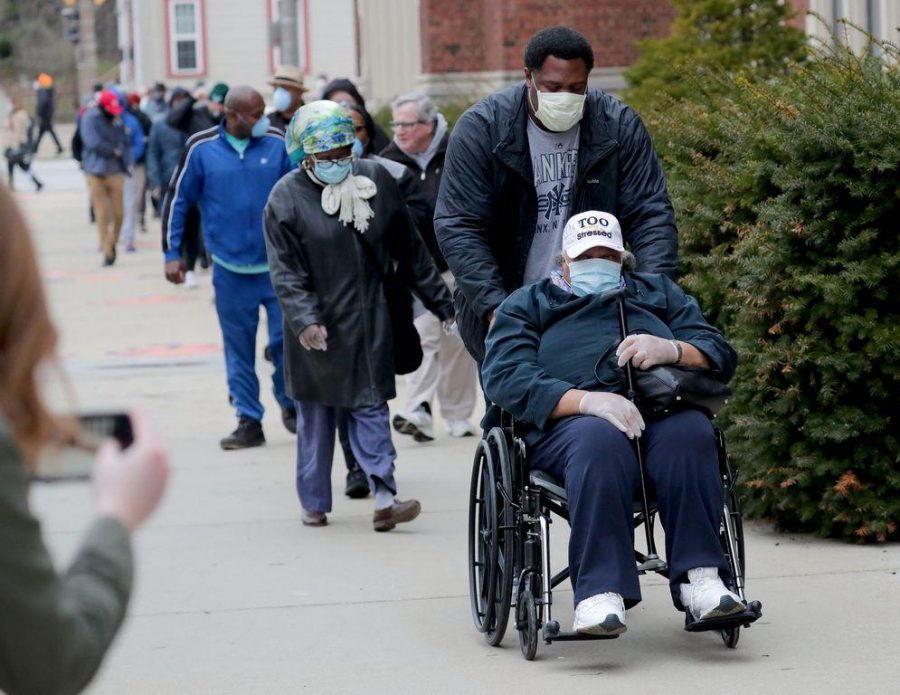Supreme Court decision disrupts students’ voting plan
Mike De Sisti/Milwaukee Journal Sentinel/TNS
79 year old Rosie Redmon waits with her son, Deshawn Hudson to vote at Riverside High School, 1615 E. Locust St. in Milwaukee on Tuesday, April 7, 2020. The Wisconsin primary is moving forward in the wake of the coronavirus epidemic after Gov. Tony Evers sought to shut down Tuesday’s election in a historic move Monday that was swiftly rejected by the conservative majority of the Wisconsin Supreme Court by the end of the day.
April 10, 2020
The Supreme Court of the United States reversed a lower court’s ruling allowing Wisconsin to extend the deadline for absentee ballots to be counted on Tuesday, forcing many of the state’s residents to choose between voting and potential exposure to COVID-19.
The 5-4 ruling overturned an executive order by Democratic Gov. Tony Evers extending the deadline for absentee voting to June 9 and potentially threw out as many as half a million mail-in ballots that had not been postmarked by April 7. The 10 other states with April primaries chose to delay primaries or shift to by-mail only voting due to the outbreak of the virus.
The ruling led Communication sophomore Max Johnson, who has been at home in Amery, Wisconsin, for nearly a month, to vote in person at his local polling place.
“I had already applied for an absentee ballot before all of this went down, so it’s probably sitting in my mailbox in Evanston right now,” he said. Once the University canceled in-person classes, Johnson was unable to return to his dorm to turn in his ballot.
While SESP sophomore Molly Schneider and SESP senior Adam Davies were both able to receive their absentee ballots, both knew of friends and family members who had not.
Logistical issues
Due to a shortage in poll workers, fewer polling places opened, resulting in massive lines that posed difficulties for those concerned about health risks or lack of time off work. SESP senior Jake Stein said this led to a “disenfranchisement” of many Wisconsinites, forcing them to choose between their safety and having their voice heard in government.
“Two of the most important things that the government can do is give its people a voice and protect its people,” Stein said. “I felt the decision to have a primary yesterday violated both of those in a pretty significant way.”
In Milwaukee — the state’s most populated city — only five of the usual 180 polling locations were open. In Waukesha, a city of 70,000 people, there was only one. Schneider’s hometown of Green Bay reduced its normal 31 polling locations to just two.
“People were expected to be waiting up to 8 hours,” Schneider said. “A friend in Green Bay had to wait 4.5. It was almost unbelievable.”
Medill junior Carly Rubin, who lives just 15 miles outside of Milwaukee in Mequon, said voting in person would have been a hard decision.
“My father is an ER physician and he’s been going into work almost every day,” she said. “I don’t think that I would’ve ended up voting, just for his sake.”
Although his town has had no confirmed cases of COVID-19, Johnson said the polling place had taken measures to limit cross contamination, including placing markers on the floor to ensure social distancing and sanitizing the voting machines after each use. He said he was able to vote quickly due to his city’s small population.
Stein, a Madison resident, noted that while he did not vote in person, he saw many visuals capturing yesterday’s primary on social media. The most stunning image for him was of Wisconsin Assembly Speaker Robin Vos, shown serving as an election inspector while dressed in full personal protective equipment.
“That really stuck with me as the most compelling visual because you’ve got someone wearing full PPE — which, by the way, should be in the hospitals, a state legislator doesn’t need that — saying to the cameras that it’s perfectly safe to go out and vote,” Stein said. “That really stung, and I know it stung for a lot of other people in Wisconsin.”
Concerns of partisan politics
The election had several consequences beyond the Democratic primary. Both Stein and Johnson said the state’s Supreme Court race was of particular importance.
“The State Supreme Court is really, really, really quite important,” Stein said. “Especially as evidenced (by) how this election — how the outcome of whether or not it would be held — was based on a state Supreme Court decision that eventually went to the US Supreme Court.”
The election will change the ideological margin of the bench, which is expected to hear several important cases in the upcoming year, including whether over 200,000 people get purged from voter rolls, Johnson said.
The executive order by Gov. Evers, the first Democrat to be elected to be Wisconsin’s governor since 2011, was opposed by the state’s Republican-dominated legislature and conservative-led Supreme Court, and eventually the Supreme Court of the United States’s conservative majority.
Davies criticized the “targeted move” because it “exacerbated” already existing voting inequalities for marginalized communities.
“Who are the people that they’re blocking from voting?” they said. “Folks in Milwaukee — which has some of the biggest racial disparities in the country — and people like my mom, who are older or have immune conditions.”
For Rubin, this was the first time she was eligible to vote in a presidential primary.
“Right now, it’s a very disenchanting time for American politics,” Rubin said. “This situation was the nail in the coffin.”
Email: [email protected]
Twitter: @meganmuncie
Email: [email protected]
Twitter: @daisy_conant
Related Stories:


